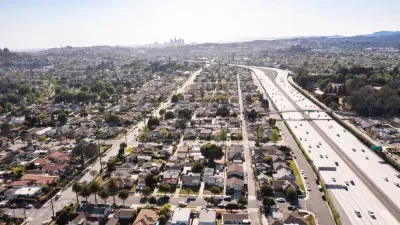A study of CEQA litigation revealed widespread abuse that experts say undermines California's environmental sustainability goals.
In August, law firm Holland & Knight released an updated comprehensive study of lawsuits filed under the California Environmental Quality Act from 2010-2012.
The report’s authors say their findings debunk the common wisdom that CEQA litigation is advanced primarily by environmentalists, or even that it serves primarily environmental purposes. In fact, the opposite may be true.
Some of the discoveries supporting this conclusion may be surprising:
- Among infrastructure projects, transit—not highways or roads—is most frequently challenged.
- Renewable energy projects are the most often challenged utility/industrial projects.
- And in the private sector, higher-density housing is most contested. Infill projects in general appear to attract challenges far more often than “greenfield” development, or sprawl.
Report co-author Jennifer Hernandez summarizes the takeaway in The Planning Report:
“CEQA litigation is not a battle between ‘business’ and ‘enviros’ … [It] is primarily the domain of Not In My Backyard (NIMBY) opponents and special interests such as competitors and labor unions seeking non-environmental outcomes.”
If CEQA is generally regarded as the province of environmentalism, then calls for CEQA reform are sometimes seen as threatening progressive goals. But Hernandez argues that moderate reforms aimed at transparency and consistency would advance sustainability and equity in the state by curbing abuse of the well-intentioned statute.
Hernandez summarized the report and her proposals in The Planning Report.
FULL STORY: New CEQA Study Reveals Widespread Abuse of Legal Process by ‘Non-Environmentalists’

Alabama: Trump Terminates Settlements for Black Communities Harmed By Raw Sewage
Trump deemed the landmark civil rights agreement “illegal DEI and environmental justice policy.”

Study: Maui’s Plan to Convert Vacation Rentals to Long-Term Housing Could Cause Nearly $1 Billion Economic Loss
The plan would reduce visitor accommodation by 25% resulting in 1,900 jobs lost.

Planetizen Federal Action Tracker
A weekly monitor of how Trump’s orders and actions are impacting planners and planning in America.

Waymo Gets Permission to Map SF’s Market Street
If allowed to operate on the traffic-restricted street, Waymo’s autonomous taxis would have a leg up over ride-hailing competitors — and counter the city’s efforts to grow bike and pedestrian on the thoroughfare.

Parklet Symposium Highlights the Success of Shared Spaces
Parklets got a boost during the Covid-19 pandemic, when the concept was translated to outdoor dining programs that offered restaurants a lifeline during the shutdown.

Federal Homelessness Agency Places Entire Staff on Leave
The U.S. Interagency Council on Homelessness is the only federal agency dedicated to preventing and ending homelessness.
Urban Design for Planners 1: Software Tools
This six-course series explores essential urban design concepts using open source software and equips planners with the tools they need to participate fully in the urban design process.
Planning for Universal Design
Learn the tools for implementing Universal Design in planning regulations.
Caltrans
Smith Gee Studio
Institute for Housing and Urban Development Studies (IHS)
City of Grandview
Harvard GSD Executive Education
Toledo-Lucas County Plan Commissions
Salt Lake City
NYU Wagner Graduate School of Public Service





























